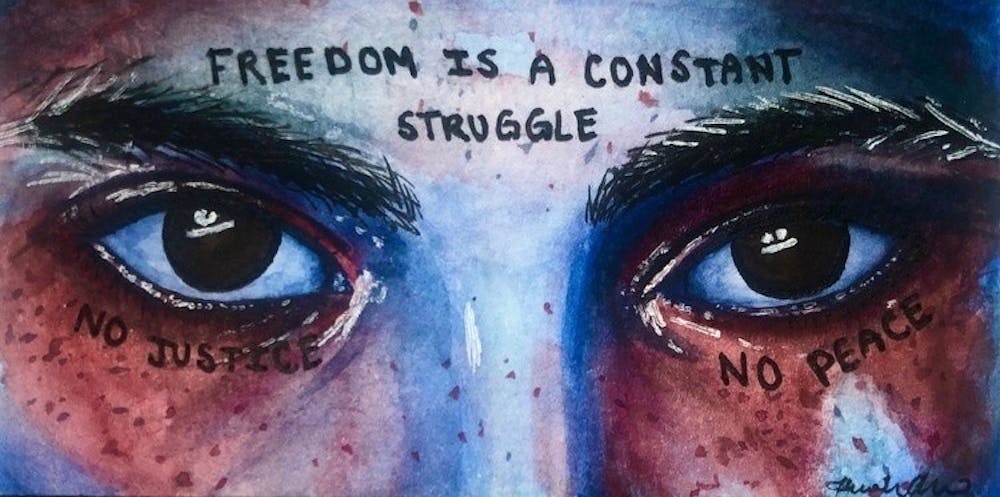Miami University’s response to the Black Lives Matter (BLM) protests and the enduring pattern of racism and police brutality in the United States has been mixed at best and, some say, deeply hypocritical at worst. However, the College of Creative Arts is taking measures to stand in solidarity with movements such as Black Lives Matter through music and education.
“Tell the World: Freedom is a Constant Struggle” was a concert sponsored by the Miami Alumni Association, the Department of Music and the Department of Diversity and Inclusion that celebrated Black composers such as Roland Bonds, Margaret Bonds, Florence Price and many others through performances of their spirituals and vocal works.
The concert began at 5:30 p.m. last Friday in front of an audience of around 70 that was large enough to create a presence but small enough to maintain social distancing. The show was filled with performances by both Miami students and alumni, from Vada Stephens’ electrifying performance of “Joshua fit the Battle of Jericho” to the stirring finale of Lauren Maynus singing “You Can Tell the World.”
Alison Acord is a former opera singer and a professor in the department of music at Miami, as well as one of the main organizers of the concert. She explained that the idea for the concert was formulated last summer, when students approached her in the wake of the BLM protests that gained traction in late May and early June.
“I had been wanting to do a concert of spirituals for many years, so I suggested this to a couple of students and the enthusiasm was overwhelming,” she said.
The idea for the name of the concert came through discussion of Miami assistant art professor Stephanie Danker’s film about the Freedom Summer, in which the phrase ‘freedom is a constant struggle’ is repeated several times. Coupled with discussion about Margaret Bonds’ spiritual “You Can Tell the World”, the name “Tell the World: Freedom is a Constant Struggle” was born.
The piece of art advertising the event was almost a stroke of pure luck. Acord described how she stumbled upon it shortly after the name for the concert was created.
“The kismet thing about it was that, later that day, I was looking at pictures from Stephanie Danker and I saw that her students had created visual responses to the Freedom Summer training module,” Acord said. “I was looking at art, and I saw this incredible painting by Hannah O’Rear that perfectly captured the name and spirit of the event.”
A concert like this hasn’t happened since 2015, when Miami graduate student Christopher Smith organized a February event in which students sang spirituals and spoke about them during recitals. While this event focused less on the narration and more on the actual performance of the songs, there was an innovative brochure that audience members could access online through scanning a QR code with their phones.
The concert meant a lot to both students and alumni that performed in the concert. Travis Pearce is a Miami alumnus who came back to the university to sing at the event. He explained his motivation for participating.
“It’s nice to have a truly live musical experience again,” he said. “I’m making music in support of a cause that I can genuinely get behind. It’s nice to have the opportunity not to speak, but to sing our purpose.”
Caleb Orr was another performer in the concert who is currently a senior vocal music education and performance student. He saw immense value in performing a concert like this.
Enjoy what you're reading?
Signup for our newsletter
“It’s the least we can do to support a cause that’s bigger than what we are,” Orr said.
While this concert was novel and progressive in many ways, the elephant in the room still remains: a majority of the students singing these spirituals were white.
Acord addressed possible concerns of cultural appropriation both in an interview and during at the beginning of the concert.
“This is an artistic expression of solidarity with the Black Lives Matter movement,” she said. “There are people who are uncomfortable with the fact that it would be mostly a group of white students signing the spirituals, but there’s no way that we can fully understand the struggle of African Americans in our country if we won’t be part of the catalyst for change.”
She went on to argue that acknowledging privilege and using it to help create change was one of the best things that those with privilege can do to help out with these issues, a mentality that led to the creation and performance of the concert on Friday.
“Being a part of this music and learning about these black composers and the history behind it can be part of a change … people are sometimes so afraid that they will offend someone or do something wrong that they do nothing,” Acord added.
In a time where racial injustice is being brought to the public eye throughout the United States, many are calling for the people in power to start making a change for the better. While the university as a whole has taken controversial steps to address these calls to action, the College of Creative Arts is taking initiative and paving the way for more education, understanding and support of the BLM movement as well as combating racial injustice through song and spirit.




